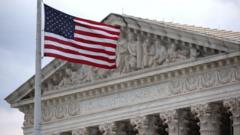The U.S. Supreme Court has reached a crucial decision regarding the allocation of public funds to religious institutions in education, particularly in Oklahoma, where plans for the nation’s first taxpayer-funded religious charter school have been blocked. On Thursday, the justices found themselves split 4-4, resulting in an affirmation of a ruling from the Oklahoma State Supreme Court that deemed the proposal unlawful.
The charter school, which was to be operated by the Catholic Archdiocese of Oklahoma City and the Diocese of Tulsa, sought approximately $23.3 million in state funding over a period of five years. Charter schools, unlike traditional public schools, are funded by taxpayers but are independently managed. A tie in the Supreme Court does not set a binding precedent nationally but indicates potential future legal battles on the matter.
In an unusual twist, Justice Amy Coney Barrett recused herself from the case, and the court refrained from issuing a formal opinion, simply stating, "The judgment is affirmed by an equally divided Court." This case has ignited debates over the First Amendment, which prohibits the government from establishing a dominant religion. The critical question revolves around whether taxpayer dollars may be funneled into religiously affiliated education.
Oklahoma Attorney General Gentner Drummond, who brought the lawsuit against the school’s formation, celebrated the court's decision as a triumph for religious freedom and taxpayer rights. He expressed concerns that financially supporting a religious charter school could lead to demands for funding a variety of religious institutions, which he labeled a potential overreach.
Conversely, the proponents of the charter school claim that it faces discrimination solely for its religious affiliation, asserting that exclusion from public funding constitutes a violation of their rights. They emphasized their commitment to parental choice in education, expressing disappointment in the ruling and announcing intentions to explore alternative methods for delivering a virtual Catholic education to families in Oklahoma.
Despite Governor Kevin Stitt's initial support for the charter school, its proposed operationalization met severe backlash, culminating in Drummond’s legal challenge. The incident reflects broader tensions surrounding the rapid expansion of charter schools in the U.S., which are often viewed by conservatives as a pathway to increased parental autonomy in educational decisions.
As this issue continues to unfold, it encapsulates the delicate balancing act between maintaining the constitutional separation of church and state while responding to the growing desire for educational choice among parents and students alike.



















